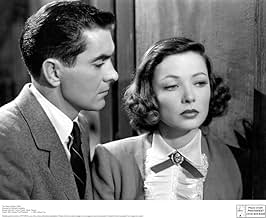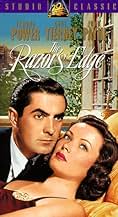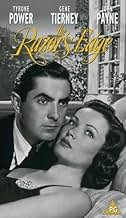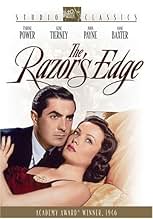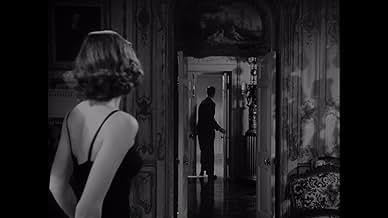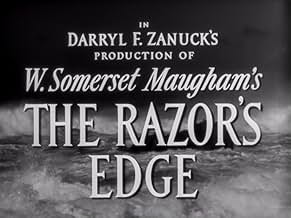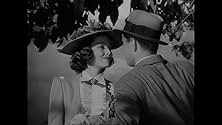CALIFICACIÓN DE IMDb
7.3/10
7.1 k
TU CALIFICACIÓN
Un joven aventurero sale a encontrarse a sí mismo y pierde a su prometida en el proceso. Pero cuando regrese 10 años después, ella no se detendrá ante nada para recuperarlo, a pesar de que y... Leer todoUn joven aventurero sale a encontrarse a sí mismo y pierde a su prometida en el proceso. Pero cuando regrese 10 años después, ella no se detendrá ante nada para recuperarlo, a pesar de que ya está casada.Un joven aventurero sale a encontrarse a sí mismo y pierde a su prometida en el proceso. Pero cuando regrese 10 años después, ella no se detendrá ante nada para recuperarlo, a pesar de que ya está casada.
- Dirección
- Guionistas
- Elenco
- Ganó 1 premio Óscar
- 6 premios ganados y 3 nominaciones en total
Dorothy Abbott
- Showgirl
- (sin créditos)
George Adrian
- Party Guest
- (sin créditos)
Demetrius Alexis
- Abbe
- (sin créditos)
Olga Andre
- Minor Role
- (sin créditos)
John Ardell
- Banker
- (sin créditos)
Frank Arnold
- Miner
- (sin créditos)
- …
Juan Arzube
- Minor Role
- (sin créditos)
- Dirección
- Guionistas
- Todo el elenco y el equipo
- Producción, taquilla y más en IMDbPro
Opiniones destacadas
British storyteller W(illiam) Somerset Maugham's 1944 speculative novel "The Razor's Edge," as did his earlier semi-autobiographical "Of Human Bondage," won a devoted following when it hit the book shelves, and so 20th Century-Fox wasted no time in securing the screen rights to this mammoth war-era adventure into existentialism. It was a difficult, elephantine undertaking but they somehow managed to carve out a screenplay and present the whole package within two years of the novel's first print.
Awesomely produced and directed, the resulting movie, for the most part, propels Maugham's central theme -- that there is good and bad in all human beings. The focus centers in on the long, spiritual quest of Larry Durrell, a basically virtuous individual who, surrounded by wealth, beauty and privilege, abandons his enviable but superficial trappings to pursue a more humble, meaningful life. Oddly enough, it's the superficial elements of the story and the more pretentious characters that hold up "The Razor's Edge," while the spiritual scenes grow flat and weary, often times stopping the action dead in its tracks.
In casting Tyrone Power as the protagonist, one finds THE major flaw in its presentation. Tagged as a pretty boy for most of his career, he managed to show only glimpses of dramatic aptitude from time to time ("Witness for the Prosecution" comes to mind). Earnest and utterly sincere in his approach, Power simply lacks the power (sorry) and the depth to carry off this complex, confused, anachronistic soul-searcher. His Durrell seems better suited amongst the shallow and superficial. One only wonders what a Robert Donat or Fredric March might have done with such a role.
Surrounding Power, however, is a stellar list of names that gussies up this production, and it is in them that we find the film's emotional impact. In particular, Gene Tierney offers one of her finest performances as Isabel, the grasping, captivating socialite obsessed with Durrell, who shows her true colors in the end when goodness and all else fails to win her the love of a man. Like Power, Tierney is a flawless, incredibly photogenic beauty who tended toward posturing instead of acting. Here she is allowed to capitalize on her tendency towards elegant frippery, offering a cool, intriguing portrait of a woman who can and will never have enough.
We are also blessed with the presence of Clifton Webb, the epitome of smug elegance, who is true to form here as the meticulous, wasp-tongued prig who is not use to being told "no." As in the classic "Laura," Webb is handed the film's most delicious lines as his character goes about buffering his unhappiness with scorn and witty sarcasm. He would warm over this character recipe many times in movies, but darned if you don't keep going back for second helpings. He is delightfully hateful and absolutely mesmerizing. Anne Baxter as the helpless, tragic Sophie is heart-wrenching, giving a florid, Oscar-winning performance that lingers long after the final reel. She, not Power, is the heart and ravaged soul of this piece. The hospital scene following her horrific accident will rip you apart, as will her subsequent degradation into alcohol and prostitution. Known for her flashy, theatrical roles, Baxter plays Sophie for all its worth.
John Payne is typically upright and appealing and does what he can in a rather stiff, thankless "other man" part, while suave Herbert Marshall, who, in reality, lost a leg in WWI but continued to act (often in a chair), portrays Maugham himself with customary flair.
Granted, "The Razor's Edge" is no "Lost Horizon" in the metaphysical department, but on its own it is quite admirable and engrossing entertainment. It manages to hold up exceedingly well under its great length and weight, feels only slightly dated, and prides itself with gorgeous production values and a handsome, handsome cast.
Awesomely produced and directed, the resulting movie, for the most part, propels Maugham's central theme -- that there is good and bad in all human beings. The focus centers in on the long, spiritual quest of Larry Durrell, a basically virtuous individual who, surrounded by wealth, beauty and privilege, abandons his enviable but superficial trappings to pursue a more humble, meaningful life. Oddly enough, it's the superficial elements of the story and the more pretentious characters that hold up "The Razor's Edge," while the spiritual scenes grow flat and weary, often times stopping the action dead in its tracks.
In casting Tyrone Power as the protagonist, one finds THE major flaw in its presentation. Tagged as a pretty boy for most of his career, he managed to show only glimpses of dramatic aptitude from time to time ("Witness for the Prosecution" comes to mind). Earnest and utterly sincere in his approach, Power simply lacks the power (sorry) and the depth to carry off this complex, confused, anachronistic soul-searcher. His Durrell seems better suited amongst the shallow and superficial. One only wonders what a Robert Donat or Fredric March might have done with such a role.
Surrounding Power, however, is a stellar list of names that gussies up this production, and it is in them that we find the film's emotional impact. In particular, Gene Tierney offers one of her finest performances as Isabel, the grasping, captivating socialite obsessed with Durrell, who shows her true colors in the end when goodness and all else fails to win her the love of a man. Like Power, Tierney is a flawless, incredibly photogenic beauty who tended toward posturing instead of acting. Here she is allowed to capitalize on her tendency towards elegant frippery, offering a cool, intriguing portrait of a woman who can and will never have enough.
We are also blessed with the presence of Clifton Webb, the epitome of smug elegance, who is true to form here as the meticulous, wasp-tongued prig who is not use to being told "no." As in the classic "Laura," Webb is handed the film's most delicious lines as his character goes about buffering his unhappiness with scorn and witty sarcasm. He would warm over this character recipe many times in movies, but darned if you don't keep going back for second helpings. He is delightfully hateful and absolutely mesmerizing. Anne Baxter as the helpless, tragic Sophie is heart-wrenching, giving a florid, Oscar-winning performance that lingers long after the final reel. She, not Power, is the heart and ravaged soul of this piece. The hospital scene following her horrific accident will rip you apart, as will her subsequent degradation into alcohol and prostitution. Known for her flashy, theatrical roles, Baxter plays Sophie for all its worth.
John Payne is typically upright and appealing and does what he can in a rather stiff, thankless "other man" part, while suave Herbert Marshall, who, in reality, lost a leg in WWI but continued to act (often in a chair), portrays Maugham himself with customary flair.
Granted, "The Razor's Edge" is no "Lost Horizon" in the metaphysical department, but on its own it is quite admirable and engrossing entertainment. It manages to hold up exceedingly well under its great length and weight, feels only slightly dated, and prides itself with gorgeous production values and a handsome, handsome cast.
I discovered this movie only recently and have watched it three times in the last two months. It's the kind of movie that rewards repeated viewings. The story, as others have commented, is moving and inspiring and way ahead of its time, dealing as it does with topics (the philosophical/spiritual quest for meaning in life, alcoholism, psychic healing, class divisions, post-war trauma, greed vs. self sacrifice) that one would expect in a movie taking place in the nineteen sixties rather than one taking place immediately following World War I. It offers the pleasure of Hollywood glamour of a very high order with one spectacular set-piece after another. Over and over, one is amazed at the staging of scenes set at balls, restaurants, night-clubs, Paris streets, factories, etc. Many jaw-dropping, pre-steadycam long takes involve the choreography of dozens of elements, e.g. one long take outside a Paris railway station, or another crane shot in a Paris night club as the camera searches the crowd for the protagonists. Everyone involved with the film seems to be working at his or her peak, from director Goulding to composer Alfred Newman, to all the perfectly cast actors. The screenplay is filled with brilliant cinematic story-telling devices (ironic voice-overs, montage sequences, foreshadowings, symbolism (the use of water and the ocean in so many scenes)that keep a long and complex story moving so smoothly that the two-hour-plus running time is hardly noticed at all. The cinematography by someone named Arthur Miller is gorgeous with lighting effects and moving camerawork that rank in the pantheon of Hollywood's visual creations. This is a great film.
Producer Darryl F. Zanuck fashioned a major production for Tyrone Power upon his return to 20th Century Fox after a stint in the military service. No expense was spared in terms of production values, and special care was taken to cast each role to "perfection."
With master story teller W. Somerset Maugham joining in writing the screenplay from his sprawling, multi-character novel, and Edmund Gouling doing the direction and Alfred Newman the score, it was a setup that couldn't miss.
The cast works at a thoroughly respectable level, and the film emerges likewise. Yet, it falls strangely short of the genuine masterpiece Zanuck obviously planned.
There is a rather cold center to "The Razor's Edge," which prevents one from being able to completely empathize with and feel for these characters and their respective plight. While they are interesting, the characters fail to ignite a deep emotional response in the viewer. One ends more observing this enactment, which has the feel of a somewhat slick presentation.
It also represents the best of what 20th Century Fox had to offer in the mid-forties. Power next went on to do "Nightmare Alley," for which he received some of the best notices of his lengthy film career.
With master story teller W. Somerset Maugham joining in writing the screenplay from his sprawling, multi-character novel, and Edmund Gouling doing the direction and Alfred Newman the score, it was a setup that couldn't miss.
The cast works at a thoroughly respectable level, and the film emerges likewise. Yet, it falls strangely short of the genuine masterpiece Zanuck obviously planned.
There is a rather cold center to "The Razor's Edge," which prevents one from being able to completely empathize with and feel for these characters and their respective plight. While they are interesting, the characters fail to ignite a deep emotional response in the viewer. One ends more observing this enactment, which has the feel of a somewhat slick presentation.
It also represents the best of what 20th Century Fox had to offer in the mid-forties. Power next went on to do "Nightmare Alley," for which he received some of the best notices of his lengthy film career.
Old Hollywood was always in trouble when dealing with Deep Think. That's because of the medium's commercial nature. When flirting with spiritual or religious beliefs, the studios simply didn't want to risk offending potential ticket buyers. So, when dealing with Deep Think (not their many biblical epics which were unabashedly Christian), the studios compromised to the point of absurdity by either flattening out the message or trivializing it. Here it's trivialized. After all, who's against Goodness. As a result, we wait 145-minutes to find out that, yes, Goodness is in fact a good and noble thing, and with that, Larry (Power) is on his way to enlightenment. And naturally, no one's offended, except maybe those who had expected something more.
Of course, the profundity is wrapped in lavishly mounted studio soap opera, with two of Hollywood's most beautiful people surrounded by whirling hosts of well-clothed extras. In fact, that opening ballroom scene is a marvel of orchestrated staging as the characters are introduced by serially playing off one another.
At the spectrum's other end, however, is that dreadful monastery scene with its painted mountain backdrop and facile dialog. Flattening the import of that pivotal scene are the repeated references to god as though that's where all paths must inevitably lead. And that's along with the spectacular alpine vistas fairly shouting celestial light from a heavenly above. I'm sure all that window dressing comforted nervous audiences who could then wink at Larry's spiritual quest and not feel the least bit threatened. But it also reduced a profound subject to a superficial level.
Another area that gets a Hollywood treatment are values and class, always tricky topics for an industry backed by Wall Street. The movie goes to pains circulating Larry among the gilded elite of Chicago as epitomized by the petulantly snobbish Templeton (Webb) and the selfishly insulated Isabel (Tierney). But, the elite's values are clearly materialistic, a spiritual dead-end in Larry's view as he heads off to learn from suffering with the working class. The screenplay thus sets up an implicit critique of the gilded class and the values that guide them. Well and good. But then the screenwriters can't seem to decide what to do with this point of view; after all, that's another touchy topic among audiences, especially coming so soon after the societal upheaval of the 1930's.
As a result, Larry never really criticizes the peer group he's been a part of, never really explains, that is, why he sees his social class as a spiritual dead-end, which of course would delve into a socially touchy subject. Nor, for that matter, does Larry explain why "salvation" lies through sharing a working class experience. We're left, I guess, to suppose the answer has to do with the suffering caused by hard physical labor and poor pay this class must endure. This subtext, however, is never really brought to the surface and remains unresolved at movie's end. Thus, big studio TCF and its head honcho, producer Zanuck, nibble around a second tinderbox topic, tantalizing us but never really delivering.
The movie does have a definite upside. For one, it's exquisitely well photographed, compensating somewhat for the 2-hour-plus run time. At the same time, the ballroom scenes are especially well choreographed and lavishly upholstered, creating an impressive air of wealth and breeding that makes Larry's renunciation a genuine material sacrifice. Then too, there's Webb's lively version of an unregenerate snob, a character he could do to waspish perfection. Also, Marshall's quietly observant author provides a needed contemplative note. However, in the film's pivotal role Power fails to provide the needed depth his character requires, or as another reviewer observes, Larry is pretty much the same after his trip to India as he was before. Fortunately, Power would later find that depth in Nightmare Alley (1947).
All in all, the movie remains an overlong visual treat that fortunately includes the exquisite Tierney. But as one might expect from old Hollywood, the film fails crucially at coming to grips with its two overriding themes—spirituality and class. As a result, two of life's most important questions are given unchallenging treatment. In short, here as elsewhere, where Deep Think is concerned, commercialism precedes all else.
Of course, the profundity is wrapped in lavishly mounted studio soap opera, with two of Hollywood's most beautiful people surrounded by whirling hosts of well-clothed extras. In fact, that opening ballroom scene is a marvel of orchestrated staging as the characters are introduced by serially playing off one another.
At the spectrum's other end, however, is that dreadful monastery scene with its painted mountain backdrop and facile dialog. Flattening the import of that pivotal scene are the repeated references to god as though that's where all paths must inevitably lead. And that's along with the spectacular alpine vistas fairly shouting celestial light from a heavenly above. I'm sure all that window dressing comforted nervous audiences who could then wink at Larry's spiritual quest and not feel the least bit threatened. But it also reduced a profound subject to a superficial level.
Another area that gets a Hollywood treatment are values and class, always tricky topics for an industry backed by Wall Street. The movie goes to pains circulating Larry among the gilded elite of Chicago as epitomized by the petulantly snobbish Templeton (Webb) and the selfishly insulated Isabel (Tierney). But, the elite's values are clearly materialistic, a spiritual dead-end in Larry's view as he heads off to learn from suffering with the working class. The screenplay thus sets up an implicit critique of the gilded class and the values that guide them. Well and good. But then the screenwriters can't seem to decide what to do with this point of view; after all, that's another touchy topic among audiences, especially coming so soon after the societal upheaval of the 1930's.
As a result, Larry never really criticizes the peer group he's been a part of, never really explains, that is, why he sees his social class as a spiritual dead-end, which of course would delve into a socially touchy subject. Nor, for that matter, does Larry explain why "salvation" lies through sharing a working class experience. We're left, I guess, to suppose the answer has to do with the suffering caused by hard physical labor and poor pay this class must endure. This subtext, however, is never really brought to the surface and remains unresolved at movie's end. Thus, big studio TCF and its head honcho, producer Zanuck, nibble around a second tinderbox topic, tantalizing us but never really delivering.
The movie does have a definite upside. For one, it's exquisitely well photographed, compensating somewhat for the 2-hour-plus run time. At the same time, the ballroom scenes are especially well choreographed and lavishly upholstered, creating an impressive air of wealth and breeding that makes Larry's renunciation a genuine material sacrifice. Then too, there's Webb's lively version of an unregenerate snob, a character he could do to waspish perfection. Also, Marshall's quietly observant author provides a needed contemplative note. However, in the film's pivotal role Power fails to provide the needed depth his character requires, or as another reviewer observes, Larry is pretty much the same after his trip to India as he was before. Fortunately, Power would later find that depth in Nightmare Alley (1947).
All in all, the movie remains an overlong visual treat that fortunately includes the exquisite Tierney. But as one might expect from old Hollywood, the film fails crucially at coming to grips with its two overriding themes—spirituality and class. As a result, two of life's most important questions are given unchallenging treatment. In short, here as elsewhere, where Deep Think is concerned, commercialism precedes all else.
To repeat, this film has everything going for it: top-notch cast, direction, no expense spared in production. It achieved an enthusiastic audience response when it came out. Why does it leave me dissatisfied?
First, it is hard to adapt a complex novel for the stage or screen. It's not impossible. Great authors, Charles Dickens for one, adapted their work for the stage. Some Dickens novels, "Great Expectations" and "Oliver Twist," at the very same time this film was being made, reached the screen magnificently in slimmed-down versions. Not this one. Apparently, Somerset Maugham prepared a screenplay. It was not used. Perhaps that was the mistake. The screenplay that was used follows the novel. But it fails to capture the essence.
Larry, the protagonist, is disillusioned with life, a reasonable reaction to WW I. He goes on his quest for spiritual enlightenment, as in the novel. He finds it, more or less. But what is it? We never know. The novel includes a long digression on that point. The movie omits it. We are left with a rather kitschy picture of a pleasant, peaceful fellow, who tells us he is well on the road to Truth, but never gives us a sign or even a signpost, neither in his speech nor in his behavior. Yet his spiritual search is presented as the key to the whole story. He seeks meaning in the quartiers populaires of Paris and in the coal mines of Picardy. Fine. I had a high school friend who disdained bourgeois life and went off to find fulfillment as a dockworker in Milwaukee. He found egotism. He came away with a happy sense of superiority that let him look down on parasitic rich people. Our Larry goes on to see the guru in the Himalayas. What profound wisdom does he imbibe? We are given no clue. He shuts himself up in a mountaintop retreat, after which he has seen It (capital I) - whatever It is. He can now face mankind. It's an old practice, not confined to Indian gymnosophists. St. Anthony and his fellows, the Desert Fathers, isolated themselves. But the aim was not to rejoin the world. It was to transcend it. Abba Macarius (or one of his fellow desert saints - I'm not sure which) was said to be so otherworldly that his disciples had to hold him down lest his body along with his spirit soar to the realm of God. Larry keeps his feet firmly planted. He returns to society. How is he changed? I can't see it. Tyrone Power plays the very same faintly vacuous character he was before. How does he use his great enlightenment? A little hypnotism to relieve John Payne of chronic migraines. He becomes a one-man AA to cure Sophie off the sauce. (Sophie, by the way, is the only skid-row alcoholic I have ever imagined who can be tracked down because she won't settle for anything less than hugely expensive liqueur.) Now I'm not calling for the movie to add a heavy explanation of transcendental spirituality. But since this is the crux of the story, we ought to get something - instead of nothing.
Anne Baxter richly deserved an Oscar. The rest of the cast makes little impression. Tyrone Power I love as an actor. He just didn't get into this character. Clifton Webb, as usual, is supremely supercilious. No one, except maybe Gladys Cooer, did superciliousness better. But that's it. Cecil Humphreys is a perfectly manicured, made-for-Hollywood yogi. They would have done far better with Sam Jaffe as he was in "Lost Horizon," a really mysterious and effective Wise Man. Gene Tierney - I hate to say it because she was marvelous in many roles - does nothing with this role. It demands much more bite. She is presented as materialistic, self-satisfied, a contrast to the ever-searching Larry. She needs to have, a touch at least, of a hard edge. Gene Tierney is sweetness all the way through, even as she commits one of the cruelest acts put on the screen. Who can sympathize with a person who deliberately inveigles a recovering alcoholic into a room, then plants her alone with a bottle of booze and a glass? The movie cries out for Claire Trevor.
Larry goes off to be a dockworker, or something. Everyone left alive resumes life as before. And we leave the movie theater, or our DVD, with ... what? The novel demands better than that.
First, it is hard to adapt a complex novel for the stage or screen. It's not impossible. Great authors, Charles Dickens for one, adapted their work for the stage. Some Dickens novels, "Great Expectations" and "Oliver Twist," at the very same time this film was being made, reached the screen magnificently in slimmed-down versions. Not this one. Apparently, Somerset Maugham prepared a screenplay. It was not used. Perhaps that was the mistake. The screenplay that was used follows the novel. But it fails to capture the essence.
Larry, the protagonist, is disillusioned with life, a reasonable reaction to WW I. He goes on his quest for spiritual enlightenment, as in the novel. He finds it, more or less. But what is it? We never know. The novel includes a long digression on that point. The movie omits it. We are left with a rather kitschy picture of a pleasant, peaceful fellow, who tells us he is well on the road to Truth, but never gives us a sign or even a signpost, neither in his speech nor in his behavior. Yet his spiritual search is presented as the key to the whole story. He seeks meaning in the quartiers populaires of Paris and in the coal mines of Picardy. Fine. I had a high school friend who disdained bourgeois life and went off to find fulfillment as a dockworker in Milwaukee. He found egotism. He came away with a happy sense of superiority that let him look down on parasitic rich people. Our Larry goes on to see the guru in the Himalayas. What profound wisdom does he imbibe? We are given no clue. He shuts himself up in a mountaintop retreat, after which he has seen It (capital I) - whatever It is. He can now face mankind. It's an old practice, not confined to Indian gymnosophists. St. Anthony and his fellows, the Desert Fathers, isolated themselves. But the aim was not to rejoin the world. It was to transcend it. Abba Macarius (or one of his fellow desert saints - I'm not sure which) was said to be so otherworldly that his disciples had to hold him down lest his body along with his spirit soar to the realm of God. Larry keeps his feet firmly planted. He returns to society. How is he changed? I can't see it. Tyrone Power plays the very same faintly vacuous character he was before. How does he use his great enlightenment? A little hypnotism to relieve John Payne of chronic migraines. He becomes a one-man AA to cure Sophie off the sauce. (Sophie, by the way, is the only skid-row alcoholic I have ever imagined who can be tracked down because she won't settle for anything less than hugely expensive liqueur.) Now I'm not calling for the movie to add a heavy explanation of transcendental spirituality. But since this is the crux of the story, we ought to get something - instead of nothing.
Anne Baxter richly deserved an Oscar. The rest of the cast makes little impression. Tyrone Power I love as an actor. He just didn't get into this character. Clifton Webb, as usual, is supremely supercilious. No one, except maybe Gladys Cooer, did superciliousness better. But that's it. Cecil Humphreys is a perfectly manicured, made-for-Hollywood yogi. They would have done far better with Sam Jaffe as he was in "Lost Horizon," a really mysterious and effective Wise Man. Gene Tierney - I hate to say it because she was marvelous in many roles - does nothing with this role. It demands much more bite. She is presented as materialistic, self-satisfied, a contrast to the ever-searching Larry. She needs to have, a touch at least, of a hard edge. Gene Tierney is sweetness all the way through, even as she commits one of the cruelest acts put on the screen. Who can sympathize with a person who deliberately inveigles a recovering alcoholic into a room, then plants her alone with a bottle of booze and a glass? The movie cries out for Claire Trevor.
Larry goes off to be a dockworker, or something. Everyone left alive resumes life as before. And we leave the movie theater, or our DVD, with ... what? The novel demands better than that.
¿Sabías que…?
- TriviaThere were 89 different sets built for the film, which had the longest shooting schedule for any film at the studio to that date. According to some news items, the film broke all previous studio box office records.
- ErroresAfter a promising beginning, in which the clothes and hairstyles of 1919 are pleasantly and reasonably accurately interpreted, as soon as it gets to 1920, then on to 1930, and beyond, Gene Tierney's hairstyle is in an unchanging, although very attractive, 1946 mode, and all of her clothes, designed by husband Oleg Cassini, except for lower hemlines, are strictly 1946, complete with the ubiquitous shoulder pads of that era. Anne Baxter's ensembles look more like Tierney/Cassini rejects, an unhappy compromise between opposing styles.
- Créditos curiososWhen the screenplay credits are shown, a curious symbol appears near W. Somerset Maugham's name. It's a symbol meant to ward off the evil eye, and it more often than not appeared on the covers of many of Maugham's novels.
- ConexionesFeatured in 20th Century-Fox: The First 50 Years (1997)
Selecciones populares
Inicia sesión para calificar y agrega a la lista de videos para obtener recomendaciones personalizadas
- How long is The Razor's Edge?Con tecnología de Alexa
Detalles
- Fecha de lanzamiento
- País de origen
- Idiomas
- También se conoce como
- The Razor's Edge
- Locaciones de filmación
- Denver, Colorado, Estados Unidos(2nd unit exteriors, backgrounds, mountains)
- Productora
- Ver más créditos de la compañía en IMDbPro
Taquilla
- Presupuesto
- USD 1,200,000 (estimado)
- Tiempo de ejecución2 horas 25 minutos
- Color
- Relación de aspecto
- 1.33 : 1
Contribuir a esta página
Sugiere una edición o agrega el contenido que falta

Principales brechas de datos
What is the French language plot outline for El filo de la navaja (1946)?
Responda
